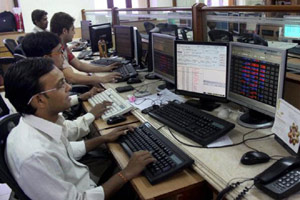Wiping out more than half of its gains in the last two sessions, BSE’s benchmark Sensex plunged 630 points on Tuesday as stocks across the board tanked amid worries that key land acquisition and GST reforms would be delayed and another sell-off in global bond markets. The rupee also tumbled by 32 paise to close at 64.17 on fresh dollar demand and capital outflows.
With the market doubting the success of important reform measures, the BSE Sensex plunged below the 27,000 level and closed 2.29 per cent lower at 26,877.48 points after two days of straight gains. The 50-share NSE Nifty also slipped below the 8,200-level by plunging 198.30 points to close at 8,126.95. Investors wealth, or market capitalisation, fell by over Rs 2 lakh crore.
Tuesday’s sell-off was triggered by a stiff political opposition to the government’s ambitious reform proposals on the GST and land acquisition. The government was forced to send the Land Bill to a joint parliamentary committee, while the Bill for roll-out of long-pending Goods and Services Tax also got referred to a Select Committee in Rajya Sabha, disappointing the markets.
Volatility in the bond markets weighed on stocks across the region, adding to existing investor anxiety over the perilous state of Greece’s finances. Even as shares in Europe and Asia fell, traders have blamed the surge on a rise in inflation expectations, higher oil prices, and restricted liquidity caused by ECB purchases.
Vinod Nair, head-fundamental research, Geojit BNP Paribas, said, “the culmination of several factors led to the sharp correction. The correction was led by FIIs in spite of the government setting up a high level committee to decide the MAT issue. Factors like increase in Europe bond yield, outperformance by other emerging markets and currency depreciation have impacted global inflows. Besides, as the domestic earnings are being downgraded and outcome from parliament session is shaky — especiall on the GST and Land Bill — the market is not taking it well.”
“FIIs have remained in the sell mode since mid-April, which has been one of the key reasons for the weakness in Indian equities. Today’s weakness can also be attributed to the global cues with the Asian and European indices trading weak. Sustained depreciation in the rupee against the dollar coupled with the ongoing weak corporate earnings season have also created nervousness. Further, the not-so-encouraging management commentaries post the results have also dented the sentiments,” said Hitesh Agrawal, head research, Reliance Securities.
For Updates Check Market News; follow us on Facebook and Twitter
